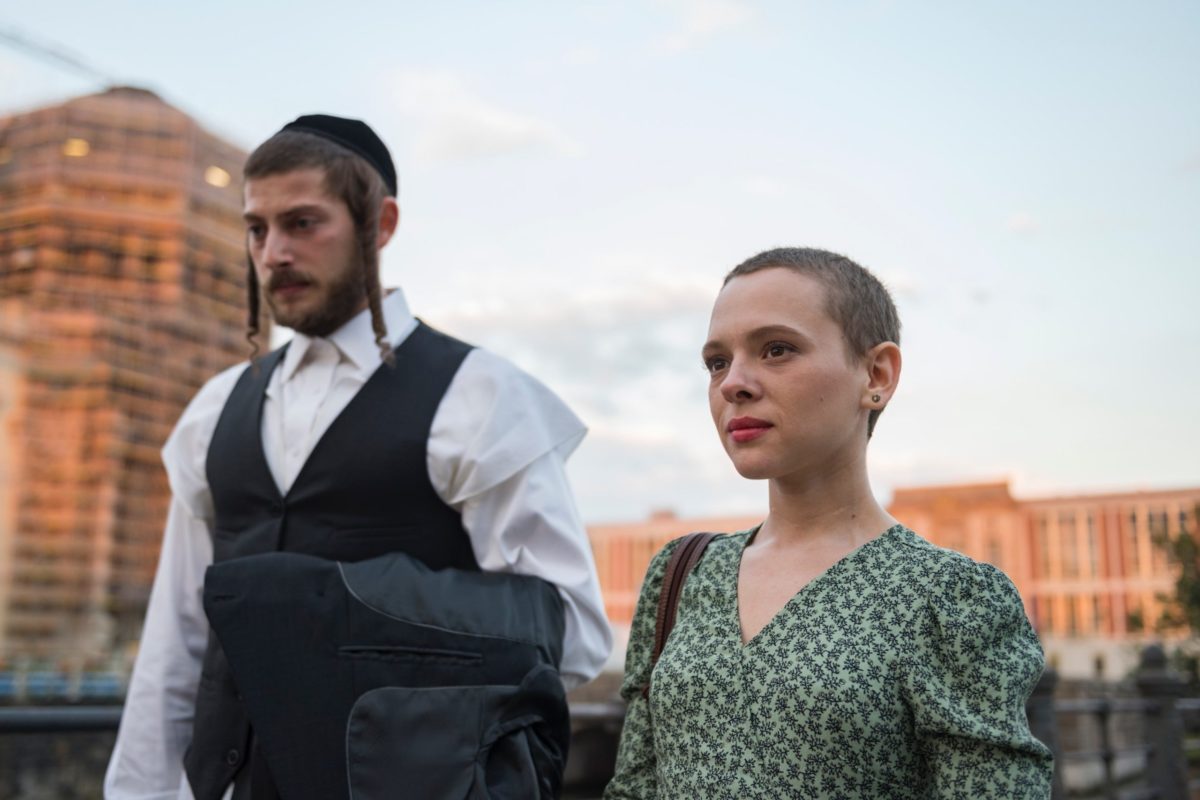A Young Hasidic Woman Finds Her Voice in the Revelatory Unorthodox
Netflix's miniseries delivers a deeply intimate coming of age story.

The opening image of Netflix’s miniseries Unorthodox is a downed eruv wire lying in the street. The eruv wire is a common tool used in Orthodox Jewish communities, a symbolic boundary that allows residents to sidestep one of the stricter rules of the Sabbath, namely a ban on carrying anything in public.
But the wire isn’t just a workaround for religious law; it’s a metaphor for the insular and deeply conservative Satmar Hasidic community located in Williamsburg, Brooklyn. It is this community that 19 year old Esty (Shira Haas) escapes from, leaving behind her beloved grandmother, her husband Yakov (known as Yanky), and the only world she has ever known.
Based on Deborah Feldman’s bestselling 2012 memoir Unorthodox: The Scandalous Rejection of My Hasidic Roots, the taut four episode miniseries follows Esty as she leaves Williamsburg and flees to Berlin. Once she arrives, Esty is befriended by a multi-cultural group of music conservatory students and begins to explore the freedom denied to women in her community. She is guided by her love of music, a practice which is discouraged among Hasidic women.
The series moves back and forth between Esty’s oppressive life in Williamsburg and her newfound freedom in Berlin. Unorthodox is the first Netflix series where the actors speak mostly in Yiddish, and offers an unparalleled look inside the deeply private Satmar community. The details, from the costumes and sets to the traditions and practices, are lovingly rendered, giving a nuanced portrait of a period existence hidden within the modern world (a 20 minute making-of documentary that accompanies the miniseries details all the work that went into this accurate portrayal).
Directed by German actor and director Maria Schrader (Aimee & Jaguar), the series takes care not to paint the Satmars as villains. Esty’s husband Yanky is a sensitive man who is well meaning but deeply limited by his beliefs. We see Esty struggle to fit into the narrow mold of ideal womanhood and chafe against the restrictions. She must also contend with the memory of her mother, who fled Williamsburg to live life as an openly queer woman in Berlin. Esty grows up carrying the burden of her mother’s sin, and the ever-present fear of losing the only community she has ever known.
But Unorthodox doesn’t shy away from the difficulties Esty faces when she enters the modern world. With a limited education and no training, Esty lacks the skills to survive outside of her close-knit community. Meanwhile, Yanky and his worldly, secular cousin Moishe (Jeff Wilbusch) follow her to Berlin to convince her to return home.
Unorthodox addresses not only Esty’s journey, but the larger story of post-Holocaust Jewish trauma that guides the Satmar community. The series also explores German Jewry, and the implications of a Jew finding freedom by returning to Germany. For all its modernity and multi-culturalism, Berlin is still a city that openly wears the wounds of World War II.
The series is anchored by a revelatory performance by Israeli actress Shira Haas (The Zookeeper’s Wife), whose wide eyes and delicate features evoke a young Natalie Portman. Haas carries much of the series in silence, using only her expressive face to convey her emotions. To put it simply, this is a star-making role for Haas.
Unorthodox is beautifully shot, both in the tight claustrophobic quarters of Williamsburg and the wide open platzes of Berlin. With stunning performances and deeply realized worlds, the series tells a poignant and deeply moving story that you won’t soon forget.
(image: Anika Molnar/Netflix)
Want more stories like this? Become a subscriber and support the site!
—The Mary Sue has a strict comment policy that forbids, but is not limited to, personal insults toward anyone, hate speech, and trolling.—
Have a tip we should know? [email protected]
